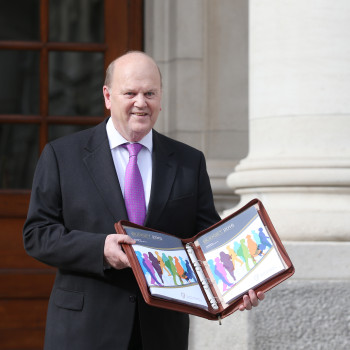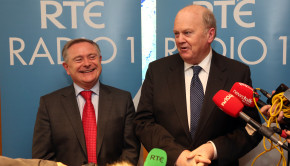Budget 2015: Alcohol, petrol and diesel unchanged but cost of 20 cigarettes upped by 40 cent

Some measures welcomed but others viewed as 'missed opportunities': The industry's response to Budget 2015
14 October 2014
Today’s Budget 2015 announcement has brought mixed news for retailers. On the plus side, Minister Noonan said the government would retain a 9% VAT rate for the hospitality sector. He also announced excise duty on alcohol will not increase and that the price of petrol and diesel will remain unchanged but that the cost of 20 cigarettes is to increase by 40 cent.
No increase in alcohol excise
The National Off-licence Association (NOffLA) and the Drinks Industry Group of Ireland (DIGI) have welcomed the government’s decision not to increase excise on alcohol, stating that the industry was hit with excise increases in Budget 2013 and 2014. The industry also welcomed the increase in excise relief for microbreweries, saying that this signified recognition of the significant role that the sector has to play in creating jobs, supporting our economy and driving tourism. However DIGI has called on the government to reverse the recent excise increases on alcohol in next year’s budget in order to create jobs and drive further growth.
The Alcohol Beverage Federation of Ireland (ABFI) which represents Irish beer, cider, whiskey, wine and spirits suppliers and manufacturers and said that today’s decision not to increase excise on alcohol would have a significant positive knock-on effect on the economy, giving a boost to the fragile economic growth in the hospitality sector, but also wanted the government to reverse excise on alcohol in next year’s budget. Kathryn D’Arcy, director of ABFI highlighted the fact that 92,000 jobs are supported by the drinks industry from grain to glass.
Commercial property consultants CBRE also reacted favourably to Budget 2015 describing it as a budget that has the potential to generate jobs and support growth in the economy. According to Marie Hunt, head of Research at CBRE: “Following several years of austerity, the Irish economy and in turn its property sector has clearly started to recover over the last 12 months. We welcome most of the initiatives announced in today’s budget, which will facilitate this momentum and enable our economy to strengthen further. However, there were also some missed opportunities in today’s budget, particularly around the area of improving the viability of much-needed private housing development in the Dublin region”.
12.5% corporate tax rate retained
The property consultants particularly welcomed the government’s commitment to retain Ireland’s 12.5% corporate tax rate, which they say is critical to inward investment and job creation, which in turn drives demand for office and industrial accommodation throughout the country. The property consultants were also complimentary of the Government’s decision to amend the 80% windfall tax on land rezoning, which they say has had a negative impact on the deliverability of much-needed housing in some locations over the last number of years and which has actually generated little or no revenue for the State since its implementation.
CBRE also welcomed the retention of the 9% rate of VAT for the hotel and tourism sector saying that retaining the VAT rate at this level will support further recovery in a sector that has begun to experience an improvement over the last 12 months and which has the potential to generate more employment in the economy in the medium term.
As had been widely anticipated, Minister Noonan today confirmed that the Capital Gains Tax (CGT) waiver that has been in place for the last number of years (enabling purchasers of real estate to avail of a 7 year exemption from CGT) is to be phased out by year-end 2014. The property consultants say that this measure served a very useful purpose in helping to kick-start recovery in the property sector when it was needed over the last number of years but is no longer required to stimulate activity. However, the property consultants pointed out that the phasing out of this tax exemption by the end of 2014 will undoubtedly create huge pressures in the industry over the coming weeks to get transactions completed by year-end.
Summary of Key Points from Budget 2015
- Economic recovery is gaining momentum. Unemployment is still too high at 11.1% but is at its lowest level in five and a half years and has now fallen for 27 months in a row
- The Finance Department forecasts GDP growth of 4.7% to be achieved in Ireland this year with the GDP forecast for 2015 revised up to 3.4%
- The so-called ‘Double Irish’ tax scheme will no longer be available to companies establishing operations in Ireland from January 2015. The mechanism will be phased out for companies already using it by the end of 2020
- Confirmation that Ireland’s 12.5% corporation tax rate “never has been and never will be up for discussion”
- The 9% VAT rate for tourism-related activity (which has been in place for the last number of years) is to be retained. It is incumbent on the industry to ensure that this relief continues to be passed through fully to the consumer and if prices begin to rise, the case for retaining the measure will diminish
- The 0.6% Pension Levy will end at the end of 2014, with the additional 0.15% Pension Levy introduced for 2014 and 2015 due to expire at the end of 2015
- Entry point to the Universal Social Charge increased to just above €12,000 removing 80,000 low income workers from the charge altogether
- The 2% USC rate reduced to 1.5%; the 4% USC rate reduced to 3.5%; new 8% USC rate for incomes in excess of €70,000 and an 11% rate of USC for self-employed income in excess of €100,000
- The Income Tax Standard Rate band increased by €1,000 to €33,800 for single individuals and top rate of income tax reduced from 41% to 40%
- Water Charges Relief worth up to €100 announced
- Price of 20 cigarettes to rise by 40c from midnight
- Home Renovations Incentive scheme extended to include rental properties up to the end of 2015
- Commitment to allocate €2.2bn to the development of social housing over the next three years
- Child benefit to increase by €5 for each child
- Additional €10 million for homeless housing and services



 Print
Print






Fans 0
Followers